Father and son 'left in limbo' by failed terror case
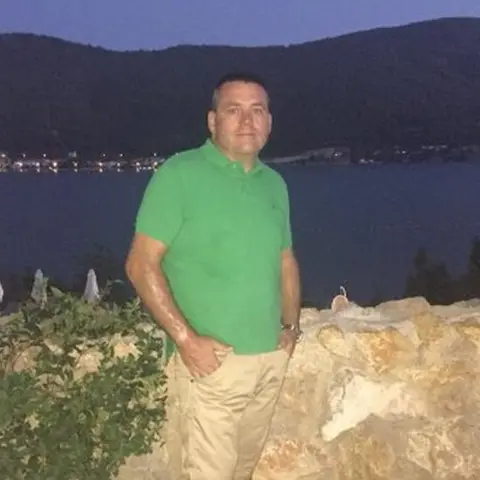 Family photo
Family photoOne morning, in December last year, Paul Newey awoke to find armed counter-terrorism police in the bedroom of his Solihull home.
He describes the moment as "horrendous".
The 49-year-old was arrested, taken for questioning, and eventually charged with funding terrorism.
The offence related to £150 he had lent to his son Daniel, who had joined the Kurdish YPG militia to fight the Islamic State group.
'In limbo'
Paul spent months on bail awaiting trial but the case has now been dropped without detailed explanation.
"What's changed between when they arrested and charged me, and now?" he asks.
"My evidence hasn't changed, so how have they let it go on for seven months and let it ruin my life?"
The father-of-four, who works in the automotive industry, says the experience has been "surreal, like being in a movie".
"My life's been on hold. In limbo."
Two co-defendants, including his 19-year-old son Sam, have also had terror charges against them dropped, bringing to five the total number of Britons charged and then acquitted of terrorism offences relating to the YPG in the past two years.
An older son, Daniel Newey, had come back to the UK after fighting with the YPG against IS in 2017-18.
Describing his original decision to travel, Daniel says: "If it's within your power to help people and to help people fight back, then it's our duty to do so.
"So out of humanity and empathy and the willingness to help free the people suffering at the hands of Daesh [IS], I decided to join YPG and join the weaponised fight against the barbarism being carried out."
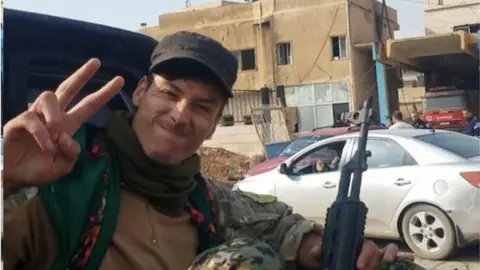 Family photo
Family photo He returned to Syria last November, saying he was motivated to defend the Kurdish people against Islamist militias backed by Turkey.
The YPG, or people's protection units, are the principal component in the Syrian Democratic Forces, which is a Western ally against IS.

Previous cases
At least two dozen Britons returned to the UK after fighting with the YPG. Some have written books about their experiences, others quietly returned to normal life.
Most, like Daniel Newey, were investigated by counter terror police, but only two were charged:
- Jim Matthews, a former soldier, was accused of attending terrorist training camps, but the case was discontinued in 2018 without explanation.
- Aidan James, from Merseyside, was the subject of a lengthy prosecution that saw him acquitted of two charges relating to the YPG and convicted of a count relating to the Kurdish PKK militia, which is a banned terrorist group under UK law.
At Aidan James's trials, the prosecution adopted a position of not inviting convictions on charges relating to the YPG if jurors decided his sole purpose was to train and fight against IS, rather than joining a wider ideological cause.
The most serious charge, preparing acts of terrorism, was dismissed after the judge ruled there was no case to answer, with jurors clearing James of attending a terrorist training camp by visiting a YPG facility.
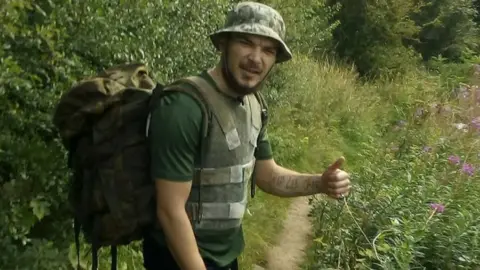 Crown Prosecution Service
Crown Prosecution ServicePassing sentence, Mr Justice Edis said: "The jury was not satisfied that the YPG had any political or religious cause beyond fighting against IS for which this training camp was delivering weapons training.
"This activity was not, on the jury's verdict 'noble cause terrorism'; at least for present purposes, it was not terrorism at all.
"The force for which you were being trained was defensive force against a lethal and genocidal threat from ISIS."

'Assisting terrorism'
One of those whom Aidan James had met while in the region was a former paratrooper from Manchester called Daniel Burke, who had travelled there following the suicide bombing in his home city in 2017.
Like his friend Daniel Newey, he eventually came home.
Police said he would not be prosecuted, but warned this could change if he travelled back to the conflict.
Last October there was a significant development on the ground in Syria
President Trump ordered a withdrawal from the north-eastern region where the US had been supporting its Kurdish allies, precipitating a Turkish offensive in order to expel the same forces, which it regards as terrorists.
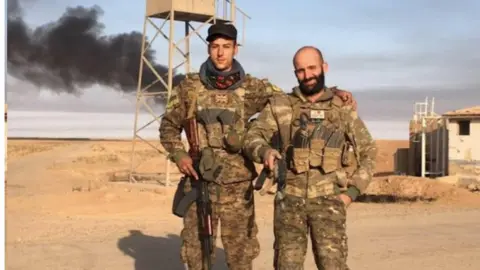 Family photo
Family photoDespite these shifts, the US military continues to provide support to the SDF and publicly praise its fighters.
Following Daniel Newey's return to Syria, police here began investigating his friends and relatives.
In December, Daniel Burke was charged with preparing to return to Syria to fight, assisting Daniel Newey to do so, and a funding offence.
Within weeks, Paul and Sam Newey were also charged, the latter with assisting his brother to prepare for terrorism by helping him fill in a form.
Sam, who was unable find work after being charged, describes the prosecution as a "joke" and a "complete waste of taxpayers' money".
Paul says he lent the £150 - a typical short-term loan to one of his children - when Daniel messaged saying his employers were late paying him.
Later, the Turkish government publicly welcomed Paul's arrest and one state media headline said he was the father of a "terrorist" and had funded a group that killed 40,000 people.
Paul thinks the entire case has been based on a "political agenda to keep Turkey happy".
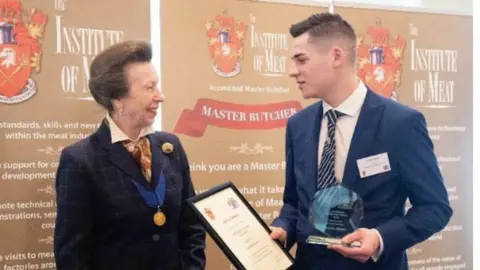 Family photo
Family photoThe case against the Neweys was joined to that of Daniel Burke, who was denied bail and kept in prison awaiting trial.
The Crown was apparently going to seek convictions on the basis that those returning to the region since October were preparing to fight Turkey and not simply IS.
Why was the case dropped?
Prosecutors have not explained why the case has now been dropped, other than there is no longer a realistic prospect of conviction.
Behind the scenes, lawyers for Daniel Burke were arguing the prosecution was an abuse of process, saying it overextended the definition of "terrorism" as set out in the Terrorism Act 2000, and that any attempts at return to Syria would have been motivated by a continued desire to defend the local Kurdish population.
The Act defines terrorism as the use or threat of action, both in and outside the UK, designed to influence any government organisation or to intimidate the public, for the purpose of advancing a political, religious, racial or ideological cause.
In essence, the defence argument was that, because the Crown had previously accepted that a defensive battle against IS was not terrorism, then how could fighting a similar defensive battle against state-backed forces be defined as such.
These arguments have not been tested in court because of the prosecution decision to drop all charges.
Andrew Hall QC, who defended Daniel Burke, says the case is an example of an "over-broad" legal provision "permitting otherwise legitimate activity to be brought within the reach of prosecution for terrorism".
The Supreme Court previously affirmed that the current definition of terrorism includes within its scope military attacks by non-state armed groups against state forces in a civil conflict, but also noted that concerns about the width of the definition merit serious consideration.
When the Terrorism Act was originally debated in Parliament 20 years ago, the then home secretary dismissed concerns about the new powers being used to prosecute Kurds seeking to drive Saddam Hussein from northern Iraq by calling such worries the product of a "fevered imagination", arguing that "in the real world in which we live, the criminal law is subject to a significant series of checks and balances".
The series of failed terrorism prosecutions relating to the YPG means that debates about these checks and balances are beginning anew.
